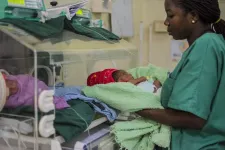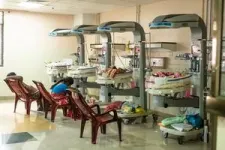(Press-News.org) A global observational study co-led by UCL (University College London), which involved more than 3,200 newborn babies suffering from sepsis in 19 hospitals in 11 countries, has shown that many newborns are dying because the antibiotics used to treat sepsis are losing their effectiveness.
The study, conducted from 2018 to 2020, found there was high mortality among infants with culture-positive sepsis (almost 1 in 5 across the hospital sites), and a significant burden of antibiotic resistance. The study has provided a wealth of high-quality data aimed at improving the treatment of newborn babies with sepsis.
The findings of the observational study have been published in a paper in PLOS Medicine co-authored by a global team of over 80 researchers spanning four continents. https://journals.plos.org/plosmedicine/article?id=10.1371/journal.pmed.1004179
The study was conducted by the Global Antibiotic Research and Development Partnership (GARDP) in collaboration with the Medical Research Council Clinical Trials Unit at UCL, whose research team led in analyzing the data; St George’s, University of London (SGUL); Penta – Child Health Research; and the University of Antwerp.
“It was very important to undertake this study to get a better understanding of the kind of infections we’re seeing in newborns in hospitals, the bugs causing them, the treatments that are being used and why we are seeing more deaths. The study has given us vital information which will help us to better design clinical trials and ultimately improve the care and outcome of babies with neonatal sepsis,” said Manica Balasegaram, Executive Director of GARDP.
Sepsis is a life-threatening bloodstream infection which affects up to 3 million babies a year globally. Every year, 214,000 newborn babies, mostly in low- and middle-income countries (LMICs), die of sepsis that has become resistant to antibiotics. Newborn babies are particularly at risk of severe infection because of their underdeveloped immune systems.
Findings
There was extensive variation in mortality between the 19 hospitals in the study, ranging from 1.6% to 27.3%, with markedly higher rates in LMICs. Leading clinicians in hospitals in Bangladesh, Brazil, China, Greece, India, Italy, Kenya, South Africa, Thailand, Vietnam and Uganda took part in the study.
“The study exposed the glaring reality of antibiotic-resistant infections, especially in hospitals in LMICs, where we are often faced with a shortage of nurses, beds and space. The risk of infections is very high and most infections are resistant to antibiotics. If an antibiotic doesn’t work, the baby often dies. This urgently needs to change. We need antibiotics that will cover all bacterial infections,” said Sithembiso Velaphi, head of paediatrics at Chris Hani Baragwanath Academic Hospital in Johannesburg, South Africa.
The study highlights a worryingly wide variation in treatment. More than 200 different antibiotic combinations were used by hospitals in the study, with frequent switching of antibiotics due to high resistance to treatments.
Many physicians were forced to use antibiotics such as carbapenems due to the high degree of antibiotic resistance to the recommended treatments in their units. These are classified by the World Health Organization as “Watch” antibiotics. They are recommended only for specific, limited indications as they need to be preserved. However, these were often the only antibiotics available to treat the infection.
Last-line antibiotics were prescribed to 15% of babies with neonatal sepsis enrolled in the study. Klebsiella pneumoniae was the most common pathogen isolated. It is usually associated with hospital-acquired infections.
Future steps to improve treatment and survival
Using the data collected, the team developed two tools that could be used in clinical trials and in any neonatal intensive care unit worldwide. The NeoSep Severity Score, based on 10 clinical signs and symptoms, could be used by clinicians to identify newborns who have a high risk of dying, and ensure they get special attention more quickly. The NeoSep Recovery Score uses many of the same clinical signs and symptoms and could provide clinicians with key information on whether to escalate treatment.
“The observational study has been instrumental in providing the high-quality data that we need to design trials of appropriate treatments for sepsis in newborn babies. It has been a huge collaborative effort by researchers and clinicians in Africa, Asia, Latin America and Europe,” said Neal Russell, Principal Investigator for the neonatal sepsis study at SGUL.
The study also aims to inform WHO guidelines on treatment for newborn babies with sepsis.
“Organisms evolve, drug resistance changes; that is why clinical guidelines for neonatal sepsis need constant adaptation. Updating guidelines relies on recent and good evidence, so this observational study is a significant step towards better treatment,” said Wolfgang Stöhr, statistician for the observational study at the MRC Clinical Trials Unit at UCL.
The results of the study have been used to design a pivotal strategic public health clinical trial to find better treatments for newborn infections in the context of increasing resistance to existing treatments.
The neonatal sepsis trial (NeoSep1) is led by GARDP together with SGUL and the MRC CTU at UCL and is being conducted at Chris Hani Baragwanath Academic Hospital in Soweto, Johannesburg, Tygerberg Hospital in Cape Town and Kilifi County Hospital in Kenya. The trial will also look at appropriate formulations and dosages for newborn babies. The trial will be expanded to other countries and regions from 2024, with a target of recruiting up to 3000 newborns overall.
“Work in formulation and dose appropriateness is imperative. Children are not small adults. Drugs must be formulated to meet their needs in a safe and effective manner,” said Alessandra Nardone, Clinical Project Manager at Penta – Child Health Research.
The new trial will benefit from vital laboratory work carried out during the observational study.
“The Laboratory of Medical Microbiology (LMM LAB-Net) functioned as the central laboratory, supporting local lab analysis for the observational study. We also performed an in-depth molecular analysis on the collected pathogens. Together, these results provide valuable information for the NeoSep1 trial,” said Surbhi Malhotra-Kumar, head of the Laboratory of Medical Microbiology at the University of Antwerp.
END
Global study highlights deaths from neonatal sepsis and steps to improve treatment
A global observational study co-led by UCL, involving more than 3,200 newborn babies suffering from sepsis in 11 countries, has shown that many newborns are dying because the antibiotics used to treat sepsis are losing their effectiveness.
2023-06-08
ELSE PRESS RELEASES FROM THIS DATE:
Why certain fish are left off the hook
2023-06-08
As warming waters threaten fish populations and disrupt fisheries around the world, it is critical to find ways to sustain fisheries while at the same time allowing those fisheries to remain economically viable to those who depend on them for their livelihoods. In the United States, commercial fishing employs 1.2 million Americans and generates more than $165 billion annually.
The primary way that the United States has protected its fisheries is through the Magnuson-Stevens Act, which was modernized in 1996 to foster the long-term biological and economic sustainability ...
In schools that could benefit most, building relationships is key to increasing capacity for nutrition education programming
2023-06-08
Philadelphia, June 8, 2023 – The US Department of Agriculture Supplemental Nutrition Assistance Program-Education (SNAP-Ed) provides nutrition programming to individuals with low income, including students and their families, through a network of community partners who implement the programs. Findings of a new study in the Journal of Nutrition Education and Behavior, published by Elsevier, suggest SNAP-Ed implementers could develop a school’s readiness for programming by concentrating efforts on cultivating relationships, program-specific capacity, and motivation at schools.
Lead author Erin McCrossan, PhD, Office of ...
Study uncovers how B cells react to skin cancer
2023-06-08
A new study that sheds light on how B cells react to skin cancer cells could pave the way for innovative therapy design.
The study, published today in Nature Communications and led by researchers from King’s College London, reveals that antibody-producing B cells in patients may be defective in responding to the most aggressive skin cancer, melanoma.
Antibodies are produced by B cells, a type of white blood cell, and are made to prevent and help fight infections. However, there is limited understanding about how B cells are prompted to respond to melanoma and why the antibodies they make are not effective.
Researchers ...
Universities in California, Arizona, and Nevada form consortium to address clean water access and sustainability challenges
2023-06-08
A novel collaboration between the University of Southern California (USC), the University of Arizona (UA), and the University of Nevada, Reno (UNR), has resulted in the Water Reuse Consortium. This groundbreaking partnership has been awarded a $12.3 million cooperative agreement for phase one of a three-phase $38 million program with ERDC-CERL to tackle pressing water challenges through innovative research, education, communication, and unprecedented collaborative efforts between government, local communities, industry, and academia.
The Water Reuse Consortium brings together ...
Henry Ford Health researchers launch clinical trial studying therapy aimed at causing brain cancer cells to self-destruct
2023-06-08
DETROIT (June 8, 2023) – Researchers in the Hermelin Brain Tumor Center at Henry Ford Health are leading a Phase I clinical trial studying the maximum tolerated dose of an oncolytic adenovirus, a mutated virus engineered to selectively replicate in and destroy cancer tissue, in combination with fractionated stereotactic radiosurgery among patients who are undergoing resection of a recurrent high-grade astrocytoma brain tumor.
“The participants in this study have progressive high-grade astrocytoma as well as glioblastoma, and are scheduled to undergo repeat surgery,” said Tobias ...
Resuscitation after on-field cardiac arrest should start with teammates
2023-06-08
It is well known that early resuscitation with cardiopulmonary resuscitation (CPR) and an automated external defibrillator (AED) saves lives, and in most sports-related sudden cardiac arrest events, trainers or medical personnel respond and initiate protocols to resuscitate a player while other athletes standby. However, time to treatment is critical, so the ability for a fellow athlete to recognize sports-related sudden cardiac arrest and initiate resuscitation while medical personnel arrive is crucial in a life-threatening event where seconds matter. However, in a new study presented at the American ...
Place of death from cancer in US states with vs without palliative care laws
2023-06-08
About The Study: The results of this study suggest that state palliative care laws are associated with an increase in the likelihood of dying at home or in hospice among decedents from cancer. Passage of state palliative care legislation may be an effective policy intervention to increase the number of seriously ill patients who experience their death in such locations.
Authors: May Hua, M.D, M.S., of the Columbia University College of Physicians and Surgeons in New York, is the corresponding author.
To access the embargoed study: Visit our For ...
Projected health outcomes associated with Supreme Court decisions in 2022 on COVID-19 workplace protections, handgun-carry restrictions, and abortion rights
2023-06-08
About The Study: The findings of this study suggest that outcomes from Supreme Court decisions in 2022 that invalidated COVID-19 workplace protections, voided state laws on handgun-carry restrictions, and revoked the constitutional right to abortion could lead to substantial harms to public health, including nearly 3,000 excess deaths (and possibly many more) over a decade.
Authors: Adam Gaffney, M.D., M.P.H., of Harvard Medical School in Boston, is the corresponding author.
To access the embargoed study: Visit our For The Media website at this ...
Accuracy of AI in estimating best-corrected visual acuity from fundus photographs in eyes with diabetic macular edema
2023-06-08
About The Study: The results of this investigation suggest artificial intelligence (AI) can estimate best-corrected visual acuity directly from fundus photographs in patients with diabetic macular edema, without refraction or subjective visual acuity measurements, often within one to two lines on an Early Treatment Diabetic Retinopathy Study chart, supporting this AI concept if additional improvements in estimates can be achieved.
Authors: Neil M. Bressler, M.D., of the Johns Hopkins University School of Medicine in Baltimore, and Editor, JAMA Ophthalmology, is the corresponding author.
To access the ...
Scientists map complete genome of millet
2023-06-08
An international team of researchers has unlocked a large-scale genomic analysis of Setaria or foxtail millet, an important cereal crop. The study, led by researchers at the Chinese Academy of Agricultural Sciences and including scientists at NYU, advances our understanding of the domestication and evolution of foxtail millet, as well as the genetic basis for important agricultural traits.
“Foxtail millet is considered to be the foundation for early Chinese civilization,” said Michael Purugganan, the ...
LAST 30 PRESS RELEASES:
Scientists identify smooth regional trends in fruit fly survival strategies
Antipathy toward snakes? Your parents likely talked you into that at an early age
Sylvester Cancer Tip Sheet for Feb. 2026
Online exposure to medical misinformation concentrated among older adults
Telehealth improves access to genetic services for adult survivors of childhood cancers
Outdated mortality benchmarks risk missing early signs of famine and delay recognizing mass starvation
Newly discovered bacterium converts carbon dioxide into chemicals using electricity
Flipping and reversing mini-proteins could improve disease treatment
Scientists reveal major hidden source of atmospheric nitrogen pollution in fragile lake basin
Biochar emerges as a powerful tool for soil carbon neutrality and climate mitigation
Tiny cell messengers show big promise for safer protein and gene delivery
AMS releases statement regarding the decision to rescind EPA’s 2009 Endangerment Finding
Parents’ alcohol and drug use influences their children’s consumption, research shows
Modular assembly of chiral nitrogen-bridged rings achieved by palladium-catalyzed diastereoselective and enantioselective cascade cyclization reactions
Promoting civic engagement
AMS Science Preview: Hurricane slowdown, school snow days
Deforestation in the Amazon raises the surface temperature by 3 °C during the dry season
Model more accurately maps the impact of frost on corn crops
How did humans develop sharp vision? Lab-grown retinas show likely answer
Sour grapes? Taste, experience of sour foods depends on individual consumer
At AAAS, professor Krystal Tsosie argues the future of science must be Indigenous-led
From the lab to the living room: Decoding Parkinson’s patients movements in the real world
Research advances in porous materials, as highlighted in the 2025 Nobel Prize in Chemistry
Sally C. Morton, executive vice president of ASU Knowledge Enterprise, presents a bold and practical framework for moving research from discovery to real-world impact
Biochemical parameters in patients with diabetic nephropathy versus individuals with diabetes alone, non-diabetic nephropathy, and healthy controls
Muscular strength and mortality in women ages 63 to 99
Adolescent and young adult requests for medication abortion through online telemedicine
Researchers want a better whiff of plant-based proteins
Pioneering a new generation of lithium battery cathode materials
A Pitt-Johnstown professor found syntax in the warbling duets of wild parrots
[Press-News.org] Global study highlights deaths from neonatal sepsis and steps to improve treatmentA global observational study co-led by UCL, involving more than 3,200 newborn babies suffering from sepsis in 11 countries, has shown that many newborns are dying because the antibiotics used to treat sepsis are losing their effectiveness.


